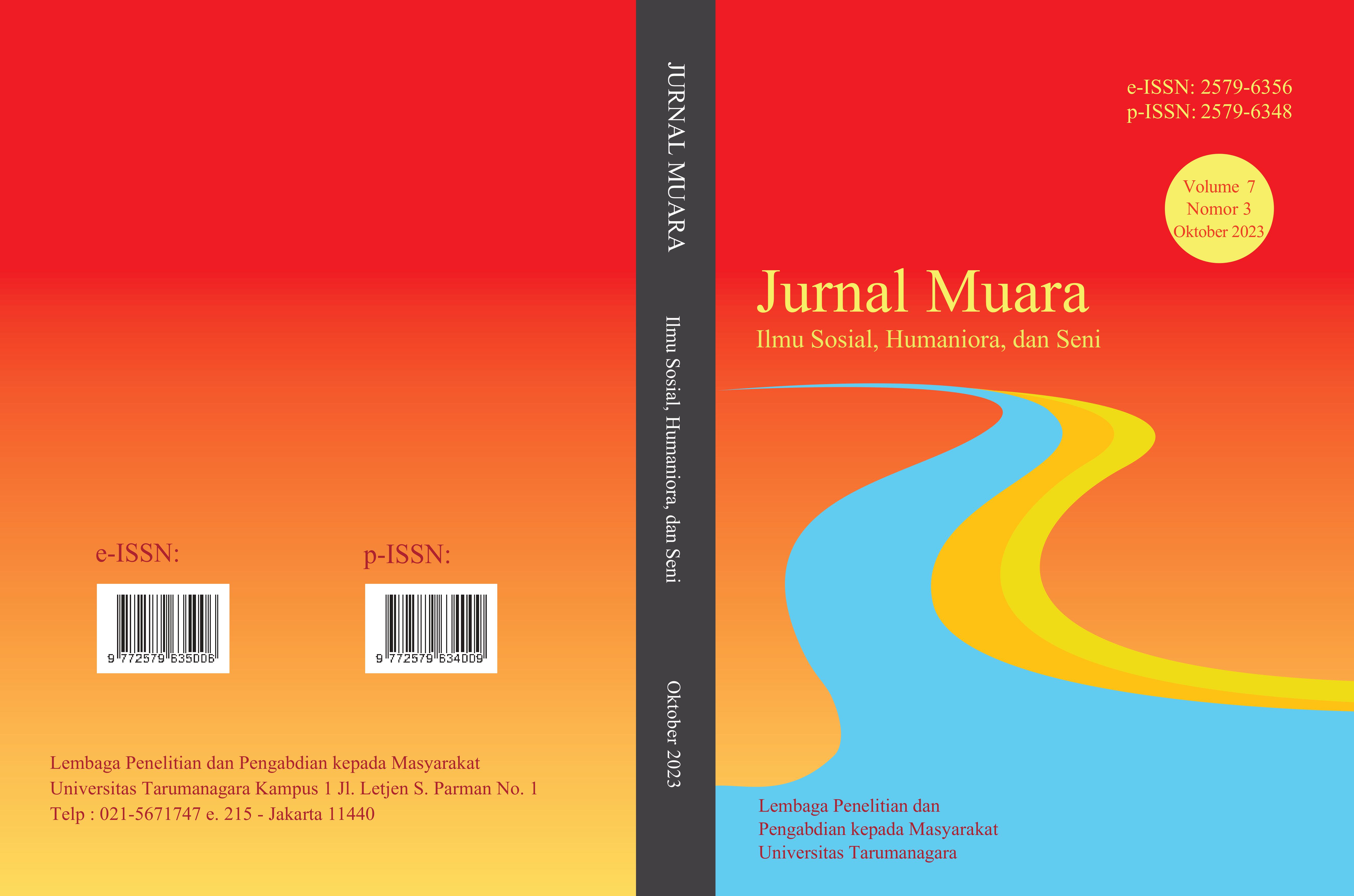BURNOUT SEBAGAI MEDIATOR HUBUNGAN WORK-FAMILY CONFLICT DAN SUBJECTIVE WELL-BEING SELAMA PANDEMI COVID-19 PERAWAT YANG BERKELUARGA
Main Article Content
Abstract
Meningkatnya jumlah pasien Covid-19 di Rumah Sakit X membuat tenaga kesehatan terutama perawat merasa kewalahan dan kelelahan yang dapat membuat perawat memiliki kepuasan hidup yang rendah karena hanya memiliki sedikit waktu untuk menikmati kehidupan sehari-harinya. Penelitian ini bertujuan untuk mengetahui peranan burnout sebagai mediator antara work-family conflict dengan subjective well-being selama masa pandemi COVID-19 pada perawat yang telah berkeluarga di Rumah Sakit X. Penelitian ini melibatkan 80 perawat yang telah berkeluarga dan bekerja di Rumah Sakit X dengan menggunakan teknik convenience sampling. Alat ukur yang digunakan dalam penelitian ini berupa Satisfaction With Life Scale (SWLS), Positive and Negative Affect Scale (PANAS), Work-Family Conflict Scale (WFCS), dan Burnout Assessment Tool (BAT). Penelitian ini dilakukan secara luring dan daring selama dua minggu. Dari analisis regresi menggunakan process bootstrap ditemukan hasil bahwa work-family conflict dapat memengaruhi burnout (ta = 8.4349; p = 0.0000), burnout dapat memengaruhi subjective well-being (tb = -2.8252; p = 0.0060), dan work-family conflict dapat memengaruhi subjective well-being (tc = -3.4740 >1.96; p = 0.0008). Ketika burnout diposisikan sebagai mediator, pengaruh antara work-family conflict terhadap subjective well-being menjadi tidak signifikan (tc’ = -0.6710; p = 0.5042). Dengan demikian, burnout terbukti berperan sebagai mediator sempurna pada hubungan antara work-family conflict dengan subjective well-being.
Article Details
Section

This work is licensed under a Creative Commons Attribution-NonCommercial-ShareAlike 4.0 International License.
This work is licensed under a Jurnal Muara Ilmu Sosial, Humaniora, dan Seni Creative Commons Attribution-ShareAlike 4.0 International License.References
Baron, R. M., & Kenny, D. A. (1986). The moderator-mediator variable distinction in social psychological research: Conceptual, strategic, and statistical considerations. Journal of Personality and Social Psychology, 51(6), 1173–1182. https://doi.org/10.1037//0022-3514.51.6.1173
Carlson, D. S., Kacmar, K. M., & Williams, L. J. (2000). Construction and initial validation of a multidimensional measure of work-family conflict. Journal of Vocational Behavior, 56(2), 249–276. https://doi.org/10.1006/jvbe.1999.1713
Chen, Y., Zhang, F., Wang, Y., & Zheng, J. (2020). Work–family conflict, emotional responses, workplace deviance, and well-being among construction professionals: A sequential mediation model. International Journal of Environmental Research and Public Health, 17(18), 1–19. https://doi.org/10.3390/ijerph17186883
CNN Indonesia. (2020, November 11). Kilas balik pandemi COVID-19 di Indonesia. CNN Indonesia. https://www.cnnindonesia.com/nasional/2020111 0123516-25-568018/kilas-balik-pandemi-covid-19-di-indonesia.
Cohen, J. (1988) Statistical power analysis for the behavioral sciences (2nd ed.). Laurence Erlbaum Associates.
Diener, E. (1984). Subjective well-being. Psychological Bulletin, 95(3), 542–575.
Diener, E., Emmons, R. A., Larsen, R. J., & Griffin, S. (1985). The satisfaction with life scale. Journal of Personality Assessment, 49, 71-75.
DiMaria, C. H., Peroni, C., & Sarracino, F. (2020). Happiness matters: Productivity gains from subjective well-being. Journal of Happiness Studies, 21(1), 139–160. https://doi.org/10.1007/s10902-019-00074-1
Drummond, S., O’Driscoll, M. P., Brough, P., Kalliath, T., Siu, O. L., Timms, C., Riley, D., Sit, C., & Lo, D. (2017). The relationship of social support with well-being outcomes via work–family conflict: Moderating effects of gender, dependants and nationality. Human Relations, 70(5), 544–565. https://doi.org/10.1177/001872 6716662696
Emerson, R. W. (2015). Convenience sampling, random sampling, and snowball sampling: How does sampling affect the validity of research? Journal of Visual Impairment & Blindness, 109(2), 164–168. https://doi.org/10.1177/0145482X 1510900215
Fakultas Kedokteran Universitas Indonesia. (2020). 83% tenaga kesehatan Indonesia mengalami burnout syndrome derajat sedang dan berat selama masa pandemi COVID-19. FKUI. https://fk.ui.ac.id/berita/83-tenaga-kesehatan-indonesia-mengalami-burnout-syndrome-derajat-sedang-dan-berat-selama-masa-pandemi-covid-19.html
Greenhaus, J. H., & Beutell, N. J. (1985). Sources of conflict between work and family roles. Academy of Management Review, 10(1), 76–88. https://doi.org/10.5465/amr.1985.4277352
Hobfoll, S. E., Halbesleben, J., Neveu, J. P., & Westman, M. (2018). Conservation of resources in the organizational context: The reality of resources and their consequences. Annual Review of Organizational Psychology and Organizational Behavior, 5, 103–128.
Hu, C., Cui, S., & Wang, L. (2016). Path analysis of work-family conflict, job salary and promotion satisfaction, work engagement to subjective well-being of the primary and middle school principals. Journal of Education and Training Studies, 4(9), 10–15. https://doi.org/10.11114/jets.v4i9.1619
Huang, S. L., Li, R. H., Fang, S. Y., & Tang, F. C. (2019). Well-being: Its relationship with work-to-family conflict and burnout among males and females. International Journal of Environmental Research and Public Health, 16(13). https://doi.org/10.3390/ijerph16132291
Lambert, E. G., Keena, L. D., Morrow, W. J., Vickovic, S. G., Haynes, S. H., May, D., & Leone, M. C. (2021). Effects of work–family conflict on Southern correctional staff burnout. Criminal Justice and Behavior, 1–22. https://doi.org/10.1177/00938548211026354
Lan, X., Liang, Y., Wu, G., & Ye, H. (2021). Relationships among job burnout, generativity concern, and subjective well-being: A moderated mediation model. Frontiers in Psychology, 12, 1–9. https://doi.org/10.3389/ fpsyg.2021.613767
Prapanjaroensin, A., Patrician, P. A., & Vance, D. E. (2017). Conservation of resources theory in nurse burnout and patient safety. Journal of Advanced Nursing, 73(11), 2558-2565.
Recuero, L. H., & Segovia, A. O. (2021). Work-family conflict, coping strategies and burnout: A gender and couple analysis. Journal of Work and Organizational Psychology, 37(1), 21–28. https://doi.org/10.5093/JWOP2021A5
Safiye, T., Vukcevic, B., & Cabarkapa, M. (2021). Resilience as a moderator in the relationship between burnout and subjective well-being among medical workers in Serbia during the COVID-19 pandemic. Vojnosanitetski Pregled, 1-19. https://doi.org/10.2298/vsp210517070s
Schaufeli, W. B., Desart, S., & De Witte, H. (2020a). Burnout assessment tool (BAT) — development, validity, and reliability. International Journal of Environmental Research and Public Health, 17(24), 1–21.
Schaufeli, W. B., De Witte, H., & Desart, S. (2020b). Manual burnout assessment tool (BAT). KU Leuven.
Watson, D., Clark, L. A., & Tellegan, A. (1988). Development and validation of brief measures of positive and negative affect: The PANAS scales. Journal of Personality and Social Psychology, 54(6), 1063–1070. https://doi.org/10.1037//0022-3514.54.6.1063
Weziak-Bialowolska, D., Bialowolski, P., Sacco, P. L., VanderWeele, T. J., & McNeely, E. (2020). Well-being in life and well-being at work: Which comes first? Evidence from a longitudinal study. Frontiers in Public Health, 103.
Zheng, X., Zhu, W., Zhao, H., & Zhang, C. (2015). Employee well-being in organizations: Theoretical model, scale development, and cross-cultural validation. Journal of Organizational Behavior, 36(5), 621–644. https://doi.org/10.1002/job
